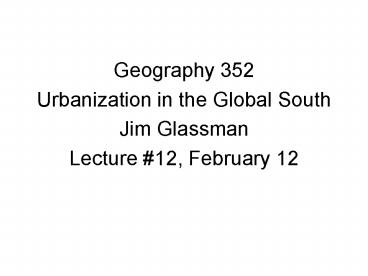Geography 352 - PowerPoint PPT Presentation
1 / 19
Title:
Geography 352
Description:
Workers as potential revolutionaries (liberals and ... of organized labor, left parties in the Global South ... Multi-party elections? Equality? Will of the ... – PowerPoint PPT presentation
Number of Views:47
Avg rating:3.0/5.0
Title: Geography 352
1
- Geography 352
- Urbanization in the Global South
- Jim Glassman
- Lecture 12, February 12
2
Political struggles and urbanization
- Workers as potential revolutionaries (liberals
and Marxists) - Greater resources of urban-industrial regions
- Greater power/organization of urban workers
- Ambiguities of the historical record
- Revolutions as having urban base?
- Revolutions as having rural base?
3
Does urbanization undercut possibilities for
revolution?
- Informal sector as barrier
- New (slightly) higher wage and consumption
opportunities in city keep rural in-migrants
occupied without opportunities for organization - Remittances to rural areas help undercut rural
immiseration and revolutionary politics while
providing some goods for city and new streams of
in-migrants - Process of involution
4
(No Transcript)
5
Does urbanization undercut possibilities for
revolution? (cont.)
- The city as a site of political surveillance
- The city as a site of co-optive politics
6
The weakness of organized labor, left parties in
the Global South
- Lack of social democratic alternatives on the
periphery - Effects of the Cold War (authoritarian regimes)
7
Populist politics and cities in the Global South
- What is populism?
- Populism and political bosses
- Populism and political demobilization
- Contradictions and limits of the attempt to
demobilize urban populations - Neo-liberal populism
- Urbanization, populism, and unions
8
Economic contradictions of populism
- Subsidized transportation and its contradictions
- Low fares important to urban poor
- Low fares may limit investment in upgrading
- Public housing and its contradictions
- Low cost housing important to urban poor
- Low cost housing may attract more in-migrants and
overburden existing housing stock, leading to
more squatter settlements
9
What is democracy?
- Participation?
- Representation?
- Multi-party elections?
- Equality?
- Will of the majority?
- A thing (institution) or a process
(democratization)?
10
Differing perspectives on democracy and politics
- Philosophical liberals (separation of politics
and economics) - Philosophical radicals (politics/economics/culture
interpenetrate) - Feminist theorists (gender a distinct axis of
political power)
11
Liberals on democracy
- Modernization theorists (e.g., Huntington)
- Neo-liberals (e.g., IMF)
- Latin American structuralists/neo-Weberians
(e.g., Lee Kwan Yew)
12
Modernization theorists on democracy
- Military dictatorship necessary during transition
- Growth of democracy with modernization and
development of middle class - Insulation of technocracy from politics
13
Neo-liberals on democracy
- Minimal government?
- Decentralization?
- Insulation of technocracy from politics
14
Latin American structuralists and neo-Weberians
on democracy
- Strong state (and ISI or EOI) necessary to
development - Military dictatorship sometimes endorsed
- Populist politics?
15
Marxists on democracy
- Fundamentalist Marxists (e.g., Marx, Stalin)
- Maoists/dependency theorists (e.g., Mao, Frank)
- World systems theorists (e.g., Taylor,
Wallerstein)
16
Fundamentalist Marxists on democracy
- State always intervenes expresses class
struggle - State must be democratized through worker
struggle - Stalinist endorsement of dictatorship of
proletariat
17
Maoists/dependency theorists on democracy
- State always intervenes expresses both class
struggle and dominance of global core - State cant be democratized without de-linking
and socialist revolution - Endorsement of national/popular struggles, role
of peasants
18
World systems theorists on democracy
- State always intervenes expresses both class
struggle and position in world system - State cant easily be democratized (in liberal
terms) within periphery or semi-periphery - Minimal endorsement of national/popular
struggles emphasis on need to change world system
19
Feminists on democracy
- Varieties of feminist politics
- The personal is political
- Gender politics and development in urbanizing
countries































